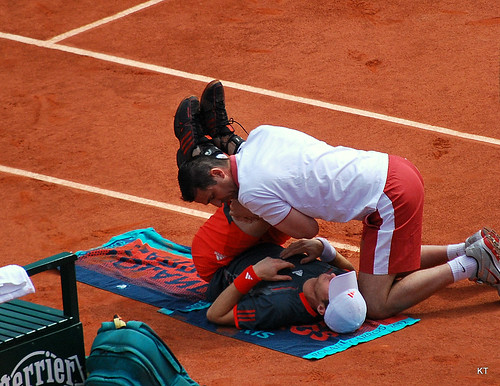 I can say that the year 2013 has set a new standard. As hard as it is for me to believe, I actually heard Christmas music while grocery shopping early this month. Yes, I am serious. There is nothing like having 8 weeks of lead time to get you into the Christmas spirit.
I can say that the year 2013 has set a new standard. As hard as it is for me to believe, I actually heard Christmas music while grocery shopping early this month. Yes, I am serious. There is nothing like having 8 weeks of lead time to get you into the Christmas spirit.
But before we forge into December, we will experience Thanksgiving. What are you giving thanks for this year? That is definitely something to ponder over that second plate of turkey and stuffing.
Meanwhile, it's time for another episode of the Rhubarb Report. Grab a plate and dig in.
 Each of us, injured or not, has a daily struggle against gravity. Fortunately for us, we adapt to the demands imposed upon us, assuming we are in an environment (cellular and metabolic) in which we can do so.
Each of us, injured or not, has a daily struggle against gravity. Fortunately for us, we adapt to the demands imposed upon us, assuming we are in an environment (cellular and metabolic) in which we can do so.
Our capacity, our load tolerance, fluctuates as a function of both training and de-training. Daily. Humans are very dynamic in this process.
Unfortunately, one of the biggest problems in the world of injury recovery is the blatant ignorance of some simple principles that govern life on planet earth.
 You can now add three more high-profile athletes that have recently found (or will soon find themselves) under the knife of the spine surgeon: tennis pro Andy Murray, former F1 world champion Kimi Raikkonen, and Arian Foster, running back for the Houston Texans.
You can now add three more high-profile athletes that have recently found (or will soon find themselves) under the knife of the spine surgeon: tennis pro Andy Murray, former F1 world champion Kimi Raikkonen, and Arian Foster, running back for the Houston Texans.
I am starting to get concerned that spine surgery is becoming trendy in international sport. At first, I thought it was just a reflection of the over-utilization that is witnessed in the general public in the United States. But now, "minor" spine surgery is all over the sports pages.
I have two words for these, and many other, athletes: directional preference.
 Speechless. Yes, that would have been me this week. It wasn't for lack of verbal capacity. I was speechless because I found myself without a voice this week. In reality, I still had a voice, but it was some strange amalgam of squeaks and crackles. It was a vocal sound worthy of puberty far more than that of a 48 year-old man.
Speechless. Yes, that would have been me this week. It wasn't for lack of verbal capacity. I was speechless because I found myself without a voice this week. In reality, I still had a voice, but it was some strange amalgam of squeaks and crackles. It was a vocal sound worthy of puberty far more than that of a 48 year-old man.
This is what happens when the allergens start kicking up in Austin. For all the positives of life in Central Texas, the pollen counts definitely have a negative impact.
I am sure you can imagine that there were at least a few students (and probably a few friends as well) that were more than happy that I was a little speechless. But I digress.
So what do you do when you are tending to a vocal impairment? Stop talking and start ... writing! Welcome to episode 079 of the Rhubarb Report.
 We spend a lot of time and energy thinking about the stimulus. It comes in the form of a training session, a treatment, or a medical intervention. In the world of sport, coaches focus on the specific training session(s) to perform in order to enhance performance. In the world of health care, we focus on the treatment intervention that will provide a specific treatment effect. The stimulus reigns supreme in our collective consciousness.
We spend a lot of time and energy thinking about the stimulus. It comes in the form of a training session, a treatment, or a medical intervention. In the world of sport, coaches focus on the specific training session(s) to perform in order to enhance performance. In the world of health care, we focus on the treatment intervention that will provide a specific treatment effect. The stimulus reigns supreme in our collective consciousness.
But a stimulus is only as good as the response it evokes. Better yet, a stimulus is only as good as the body's ability to recover from and adapt to the applied stimulus.
Recovery is the critical, and oftentimes forgotten, component of optimal health.
 You have the freedom of speech. You have the freedom of assembly. You have the freedom of expression.
You have the freedom of speech. You have the freedom of assembly. You have the freedom of expression.
In the United States, you have a lot of freedoms and rights. But, strangely enough, you don't have the freedom to choose your health care provider. There is, more often than not, some gatekeeper-driven law that is trying to "protect you" while ultimately controlling who you receive care from and how it takes place.
Most would consider this blatantly unacceptable if it happened to their freedom of speech or expression. But in the vast majority of US states (32), this is exactly what happens.
In health care in 2013, it is high time for consumers to have The Right To Choose.
 Breaking news: the US government is back in operation. I have trouble at times deciding if that is a good thing or a bad thing these days. But suffice it to say that we are back to "business as usual" - it's the "as usual" that is the most problematic aspect of that phrase.
Breaking news: the US government is back in operation. I have trouble at times deciding if that is a good thing or a bad thing these days. But suffice it to say that we are back to "business as usual" - it's the "as usual" that is the most problematic aspect of that phrase.
It's been a bit of a crazy October for me. Between my 25th college reunion and a speaking engagement at an annual conference, I have found myself out of town for about a third of the month. That's enough to keep me feeling a little out of sync. I am looking forward to November, though with it comes a time change and the realization that the sun sets a whole lot earlier in wintertime.
Onwards to Episode 078 of the Rhubarb Report!
 "Running Injuries: Etiology And Recovery- Based Treatment" (co-author Bridget Clark, PT) appears in the third edition and fourth editions of "Clinical Orthopaedic Rehabilitation: A Team Approach" by Charles Giangarra, MD and Robert C. Manske, PT.
"Running Injuries: Etiology And Recovery- Based Treatment" (co-author Bridget Clark, PT) appears in the third edition and fourth editions of "Clinical Orthopaedic Rehabilitation: A Team Approach" by Charles Giangarra, MD and Robert C. Manske, PT.
 Allan Besselink, PT, DPT, Ph.D., Dip.MDT has a unique voice in the world of sports, education, and health care. Read more about Allan here.
Allan Besselink, PT, DPT, Ph.D., Dip.MDT has a unique voice in the world of sports, education, and health care. Read more about Allan here.
 Top 5 finalist in three categories: "Best Overall Blog", "Best PT Blog" and "Best Advocacy Blog".
Top 5 finalist in three categories: "Best Overall Blog", "Best PT Blog" and "Best Advocacy Blog".